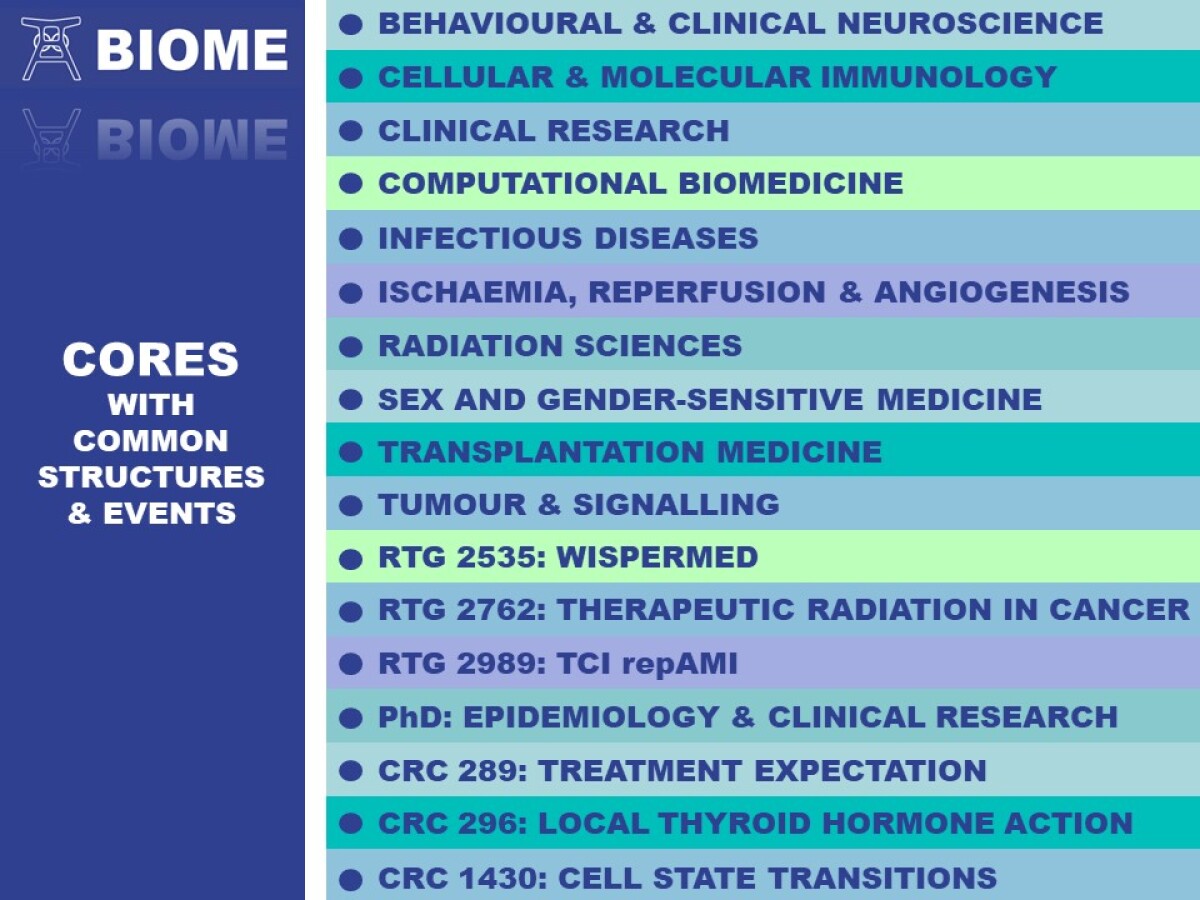BIOME - Concept

Concept
The Faculties of Biology and Medicine have a number of successful and flourishing research training groups (RTGs) funded by the German Research Foundation (DFG) whose training programmes form the scientific basis of BIOME:
- RTG 2535: WisPerMed
- RTG 2762: Therapeutic Radiation in Cancer
- RTG 2989: TCI repAMI
Reflecting the structures of the above initiatives, ten cores of further expertise within the Graduate School of Biomedical Science have been established, namely:
- Behavioural and Clinical Neuroscience
- Cellular and Molecular Immunology
- Clinical Research (a one-year, workshop-based programme)
- Computational Biomedicine
- Infectious Diseases
- Ischaemia, Reperfusion and Angiogenesis
- Radiation Sciences
- Sex and Gender-Sensitive Medicine (kick-off: winter semester 2024/25)
- Transplantation Medicine (a one-year programme specifically aimed at MD graduates)
- Tumour and Signalling
In addition to this, there is one independently-initiated PhD programme on Epidemiology and Clinical Research, and a further three DFG-funded collaborative research centres (CRCs) sharing our graduate school training structures and network:
- PhD Epidemiology and Clinical Research
- CRC 289: Treatment Expectation
- CRC 296: Local Thyroid Hormone Action
- CRC 1430: Molecular Mechanisms of Cell State Transitions.
Furthermore, BIOME's core on Behavioural and Clinical Neuroscience has established a strong and mutually beneficial regional collaboration with the CRC 1280: Extinction Learning which is anchored at the neighbouring Ruhr University Bochum.

Doctoral Programme Structure
Each of these thematic cores has up to four scientific coordinators who are responsible for the design of the lecture series, the selection of guest speakers and the topics of the talks. In addition to the graduate's own supervisor, these coordinators are also supporting mentors to the graduates within their group. To ensure academic excellence and close collaboration, each group is limited to a maximum of 25 participants.
The obligatory core lecture series consists of up to 20 lectures a year with literature seminars or doctoral progress reports after each talk.
Each core has regular meet-the-expert forums which are held on campus. A novel concept surrounding these meetings is that the graduates are encouraged to interact closely with the guest speakers and discuss their research with them.
Larger annual retreats or joint symposia are held regularly for all participants of the graduate school. At these events the participants have the opportunity to inform themselves about the work and findings of the other research groups through basic introductory presentations to each field by selected graduates, and doctoral project poster presentations by every participating doctoral fellow.
Regular workshops for the targeted training of career-related soft skills are an integral part of the BIOME programme. Topics include scientific writing, presentations, good scientific practice, acquisition of funding etc.
Satisfactory participation in BIOME’s graduate programme is awarded with credit points endorsed by the doctoral regulations of the Faculties of Biology (§ 6a) and Medicine (§ 10, Anlage 6 A + B).
